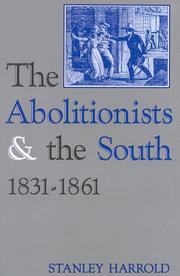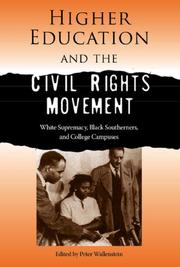| Listing 1 - 10 of 14 | << page >> |
Sort by
|

ISBN: 081310968X 0813148243 0813170508 9780813170503 9780813109688 0813119065 9780813119069 0813187346 Year: 1995 Publisher: Lexington University Press of Kentucky
Abstract | Keywords | Export | Availability | Bookmark
 Loading...
Loading...Choose an application
- Reference Manager
- EndNote
- RefWorks (Direct export to RefWorks)
Within the American antislavery movement, abolitionists were distinct from others in the movement in advocating, on the basis of moral principle, the immediate emancipation of slaves and equal rights for black people. Instead of focusing on the ""immediatists"" as products of northern culture, as many previous historians have done, Stanley Harrold examines their involvement with antislavery action in the South--particularly in the region that bordered the free states. How, he asks, did antislavery action in the South help shape abolitionist beliefs and policies in the period leading up to the
Abolitionists --- Antislavery movements --- Social reformers --- Abolitionism --- Anti-slavery movements --- Slavery --- Human rights movements --- History --- Southern States --- 19th century
Book
ISBN: 0807899550 9780807899557 9781469603889 1469603888 9780807834312 0807834319 1469606852 0807899690 9798893134087 Year: 2010 Publisher: : The University of North Carolina Press,
Abstract | Keywords | Export | Availability | Bookmark
 Loading...
Loading...Choose an application
- Reference Manager
- EndNote
- RefWorks (Direct export to RefWorks)
During the 1840's and 1850's, a dangerous ferment afflicted the North-South border region, pitting the slave states of Maryland, Virginia, Kentucky, and Missouri against the free states of New Jersey, Pennsylvania, Ohio, Indiana, and Illinois. Aspects of this struggle--the underground railroad, enforcement of the fugitive slave laws, mob actions, and sectional politics--are well known as parts of other stories. Here, Stanley Harrold explores the border struggle itself, the dramatic incidents that it comprised, and its role in the complex dynamics leading to the Civil War. Border War
Slavery --- Antislavery movements --- Fugitive slaves --- History --- Legal status, laws, etc. --- Legal status of slaves in free states. --- Law and legislation --- United States. --- Border States (U.S. Civil War) --- United States --- Upper South (U.S. Civil War) --- Southern States --- Causes. --- Fugitive enslaved persons --- Regions & Countries - Americas --- United States - General --- History & Archaeology --- Legal status, laws, etc --- Legal status of enslaved persons in free states --- Legal status of slaves in free states --- Legal status of enslaved persons in free states.
Book
ISBN: 0809336421 0809336413 9780809336425 9780809336418 Year: 2018 Publisher: Carbondale
Abstract | Keywords | Export | Availability | Bookmark
 Loading...
Loading...Choose an application
- Reference Manager
- EndNote
- RefWorks (Direct export to RefWorks)
Abolitionists --- Antislavery movements --- History --- Lincoln, Abraham, --- Linkŭln, Abrakham, --- Linkolʹn, Avraam, --- Linkūln, Ibrāhīm, --- Linkan, ʼAbrehām, --- Lincoln, A. --- Lin-kʻen, --- Linken, --- Lin, Kʻen, --- Lingkʻŏn, --- Lincoln, Abe, --- Liṅkan, Ēbrāhaṃ, --- Liṅkan, Abrahāṃ, --- לינקאלין, --- לינקאלן, אייברעהעם, --- לינקולן, אברהם --- 林肯, --- Liṅkana, Ābrāhama, --- Views on slavery.
Book
ISBN: 1439666032 1625859759 Year: 2019 Publisher: The History Press
Abstract | Keywords | Export | Availability | Bookmark
 Loading...
Loading...Choose an application
- Reference Manager
- EndNote
- RefWorks (Direct export to RefWorks)
Book
ISBN: 9781405156639 Year: 2008 Publisher: Malden [etc.] Blackwell Publishing
Abstract | Keywords | Export | Availability | Bookmark
 Loading...
Loading...Choose an application
- Reference Manager
- EndNote
- RefWorks (Direct export to RefWorks)

ISBN: 9780813031620 Year: 2008 Publisher: Gainesville University press of Florida
Abstract | Keywords | Export | Availability | Bookmark
 Loading...
Loading...Choose an application
- Reference Manager
- EndNote
- RefWorks (Direct export to RefWorks)
Civil rights movements --- College integration --- Social change --- History --- History --- History
Book
ISBN: 0813050863 0813055415 9780813055411 9780813060798 0813060796 9780813050867 Year: 2015 Publisher: Gainesville
Abstract | Keywords | Export | Availability | Bookmark
 Loading...
Loading...Choose an application
- Reference Manager
- EndNote
- RefWorks (Direct export to RefWorks)
Focusing on Charleston, South Carolina, Jeff Strickland examines the ways that race, ethnicity, and class shaped the political economy of this vital Southern city during the second half of the nineteenth century.
Racism --- White supremacy movements --- African Americans --- Afro-Americans --- Black Americans --- Colored people (United States) --- Negroes --- Africans --- Ethnology --- Blacks --- Bias, Racial --- Race bias --- Race prejudice --- Racial bias --- Prejudices --- Anti-racism --- Critical race theory --- Race relations --- Supremacist movements, White --- Supremacy movements, White --- White supremacist movements --- Social movements --- White nationalism --- Skinheads --- History. --- Social conditions. --- South Carolina --- South Carolina (Colony) --- South Carolina (Province) --- I︠U︡zhnai︠a︡ Karolina --- Black people
Book
ISBN: 0813053420 0813052041 9780813052045 0813054974 Year: 2017 Publisher: Gainesville
Abstract | Keywords | Export | Availability | Bookmark
 Loading...
Loading...Choose an application
- Reference Manager
- EndNote
- RefWorks (Direct export to RefWorks)
Through her case study of Craven Operation Progress, Karen Hawkins challenges a number of assumptions regarding the Community Action Agencies (CAAs), central among them being that middle-class whites on CAA boards were either uninterested or unable to meet the needs of poor citizens and that biracial agreement and cooperation was essentially impossible. Drawing from untapped primary sources, Hawkins finds some successes in interracial cooperation. Hawkins contends that it was not only liberal action that led to economic and social change in Eastern North Carolina, but also moderate compromise and open mindedness.
Community development --- Economic assistance --- Public welfare --- Poor --- Economic aid --- Foreign aid program --- Foreign assistance --- Grants-in-aid, International --- International economic assistance --- International grants-in-aid --- Economic policy --- International economic relations --- Conditionality (International relations) --- Regional development --- Economic assistance, Domestic --- Social planning --- Disadvantaged, Economically --- Economically disadvantaged --- Impoverished people --- Low-income people --- Pauperism --- Poor, The --- Poor people --- Persons --- Social classes --- Poverty --- Citizen participation --- Government policy --- Economic conditions --- Craven Operation Progress, Inc. --- North Carolina --- Craven County (N.C.) --- Craven Co., N.C. --- State of North Carolina --- Carolina del Norte --- NC --- N.C. (North Carolina) --- N. Car. --- Noord-Carolina --- Carolina d'o Norte --- Estato de Carolina d'o Norte --- Şimali Karolina --- Штат Паўночная Караліна --- Shtat Paŭnochnai︠a︡ Karalina --- Паўночная Караліна --- Paŭnochnai︠a︡ Karalina --- Not Carolina --- Sjeverna Carolina --- Carolina an Norzh --- Norzhkarolina --- Северна Каролина --- Severna Karolina --- Щат Северна Каролина --- Shtat Severna Karolina --- Carolina del Nord --- Çурçĕр Каролина --- Śurśĕr Karolina --- Severní Karolína --- Gogledd Carolina --- Náhookǫsjí Kééláanah Hahoodzo --- Põhja-Carolina --- Põhja-Carolina osariik --- Βόρεια Καρολίνα --- Voreia Karolina --- Πολιτεία της Βόρειας Καρολίνας --- Politeia tēs Voreias Karolinas --- Estado de Carolina del Norte --- Norda Karolino --- Ipar Carolina --- Caroline du Nord --- Noard Karolina --- Carolina Thuaidh --- Carolina Hwoaie --- Poyraz Karolina --- Carolina a Tuath --- Ар Карелайн --- Ar Karelaĭn --- Norda-Karolina --- Nort Kárólínạ --- Carolina Utara --- Negara Bagian Carolina Utara --- Kaaruuliinaa tunuviaq --- Nigiq Carolina --- Цæгат Каролинæ --- T︠S︡ægat Karolinæ --- Norður-Karólína --- קרוליינה הצפונית --- Ḳarolinah ha-Tsefonit --- Karolina Gledh --- Karolin dinò --- Karolînaya Bakur --- Йыдвел Каролина --- Ĭydvel Karolina --- Province of North Carolina --- Race relations. --- Social conditions.
Book
ISBN: 0813053803 0813052394 9780813052397 9780813056036 0813056039 Year: 2018 Publisher: Gainesville
Abstract | Keywords | Export | Availability | Bookmark
 Loading...
Loading...Choose an application
- Reference Manager
- EndNote
- RefWorks (Direct export to RefWorks)
Approaching the period of 1880-1930 in American literature as one in which the processes of rethinking the past were as prevalent as wholly "new" works of art, this collection treats the century's long turn as a site that overtly staged the tension among conflicting sets of values--those of past, present, and the imagined future. As the authors of this collection demonstrate, the literature from the century's turn is irreducible to the characteristics either of the nineteenth or the twentieth centuries; rather, it is literature of dual practices and multiple values that embodies elastic qualities of historical plurality--a true literature in transition.
Slaves --- Slavery --- Fugitive slaves --- Underground Railroad --- Emancipation --- History. --- Enslaved persons
Book
ISBN: 0813072921 0813067154 0813057868 0813066948 9780813057866 9780813066943 Year: 2021 Publisher: Gainesville
Abstract | Keywords | Export | Availability | Bookmark
 Loading...
Loading...Choose an application
- Reference Manager
- EndNote
- RefWorks (Direct export to RefWorks)
This title details how African American women used lessons in basic literacy to crack the foundation of white supremacy and sow seeds for collective action during the civil rights movement. Deanna Gillespie traces the history of the Citizenship Education Program (CEP), a grassroots initiative that taught people to read and write in preparation for literacy tests required for voter registration - a profoundly powerful objective in the Jim Crow South. Born in 1957 as a result of discussions between community activist Esau Jenkins, schoolteacher Septima Clark, and Highlander Folk School director Myles Horton, the CEP became a part of the Southern Christian Leadership Conference in 1961. The teachers, mostly Black women, gathered friends and neighbors in living rooms, churches, beauty salons, and community centers.
| Listing 1 - 10 of 14 | << page >> |
Sort by
|

 Search
Search Feedback
Feedback About UniCat
About UniCat  Help
Help News
News